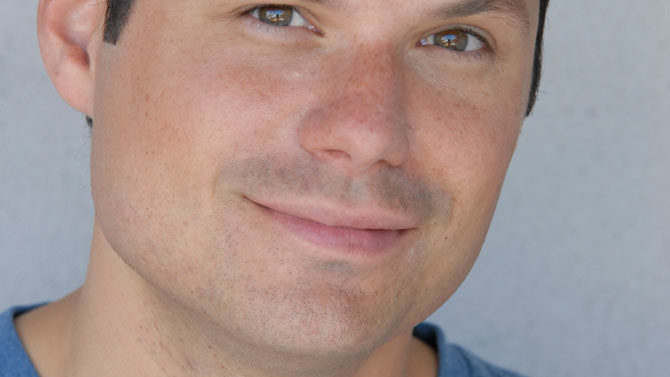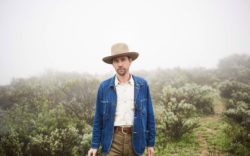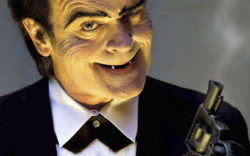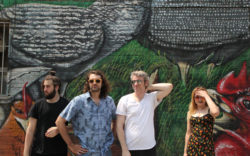You know him—the disarming smile, the warm but sarcastic tone, the irreverent attitude paired with a bright, alert, at times joyful delivery. You might know him from “The State,” Wet Hot American Summer, “Stella,” “Michael & Michael Have Issues,” “Inside Amy Schumer,” “Another Period,” or maybe “Ed.” (Anyone else remember “Ed”?) The point is: You know Michael Ian Black, because everywhere he shows up, he makes you laugh.
Black has the sly charm your trouble-making friend in middle school used to win over your mom, and he’s been deploying it like a comedic ninja since the early ’90s. If American comedy was the Marvel Cinematic Universe, he’d be Black Widow: appearing out of nowhere, executing his targets with with style and stealing the spotlight even as he disappears back into the shadows. And like the character, he’s only become more interesting over time, revealing new depths while staying true to his persona.
Black began his television career just out of college, when his troupe The State scored a deal with MTV. In 1993, the rambunctious ensemble introduced a new generation to the joy of sketch and released 11 talented comedians into the American comedy ecosystem. They’ve been responsible for great comedy ever since, and Black may be their most visible alumnus.
A visit to Athens just after the debut of “The State” would prove prescient in that regard. Stopping through on a road trip with one of his co-stars, Black happened to see Michael Stipe hanging out in a bar, and Stipe recognized him. “[H]e said to us, ‘Hey, are you guys TV stars?’” Black recalls. “We didn’t feel like TV stars yet, and so I said, ‘No.’ And then, somewhat cheekily, I said, ‘Are you a rock star?’ And he goes, ‘Yeah.’ I was very impressed by his confidence. To this day, I wish I had that kind of swagger.”
Fans might be surprised to hear that Black’s confidence isn’t at rock-star level, as cocky self-assurance is a fixed aspect of his comedic make-up. But he’s admitted in interviews that he’s deeply self-conscious, and other non-scripted appearances—performing stand-up, riffing on Twitter—reveal a thoughtfulness that his roles don’t always allow for.
That thoughtfulness was on full display in his recent New York Times op-ed, “The Boys Are Not All Right,” written in the wake of the Parkland school shooting. In it, he makes a powerful and lucid case that our “suffocating, outdated model of masculinity” is a trap that’s given men only two choices when feeling lost: “withdrawal or rage.” The piece netted him interviews on NPR, CNN and elsewhere, and has helped draw the ongoing conversation out from academic and activist circles and into the mainstream.
“It’s something that I have spent a fair amount of time thinking about, and writing about to a certain extent,” says Black, referring to Navel Gazing, the latest of his three essay collections. “But I wasn’t even sure I wanted to make this kind of deliberative public statement, because I sensed that it was such a vast and deep topic. I didn’t know if I was prepared to start that journey in a public way. But I guess I felt like, if I can be helpful here, I want to be.”
In fact, Black has written two children’s books tackling emotions, I’m Bored and the forthcoming I’m Sad. He’s been educating himself further about the topic of masculinity and has agreed to be part of a panel discussion at a conference. “The last thing I want to be is the celebrity who’s taken up a cause,” says Black. “One, because I’m a celebrity with the lowest-case ‘C’ that there is, but also because I find myself cringing a little bit when I see celebrities and their causes, the way I think a lot of people do. It can come across as very self-serving, and that’s what I’m trying to avoid to the best of my ability.”
He admits, however, that his career as a children’s book author—he’s written eight so far, covering topics like animal butts and Donald Trump, in addition to emotions—was almost entirely ego-driven. “There was no more forethought than reading to my own children every night and thinking to myself… ‘I could write a book at least as terrible as the one I’m reading right now. And if so, I’ll make a fortune!’” he says. “As it turns out, I can write a book that terrible, but also there was was no fortune to be made.”
With such a collection of projects—he also finds time to conduct long-form interviews for his podcast “How to Be Amazing,” in which he’s talked with opera singers, mountain climbers, pundits and artists—Black has trouble choosing a favorite. “I enjoy them all at different times and in different ways,” he says. “But as I get older, I find that the thing I enjoy most is whatever allows me to stay in sweatpants the longest.”
Like what you just read? Support Flagpole by making a donation today. Every dollar you give helps fund our ongoing mission to provide Athens with quality, independent journalism.









